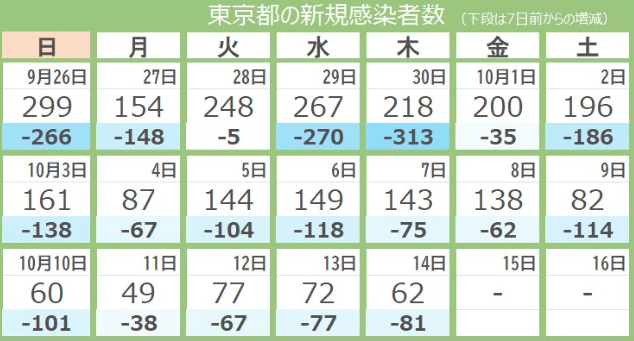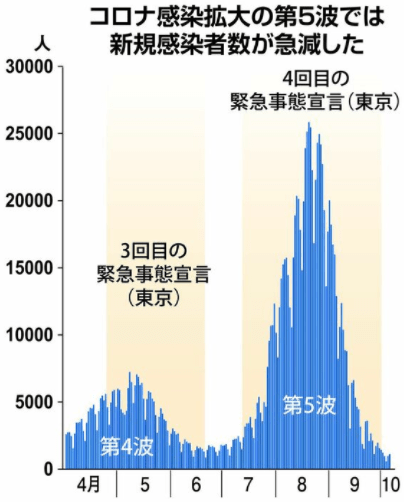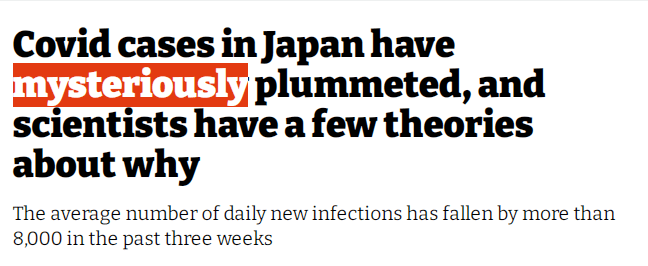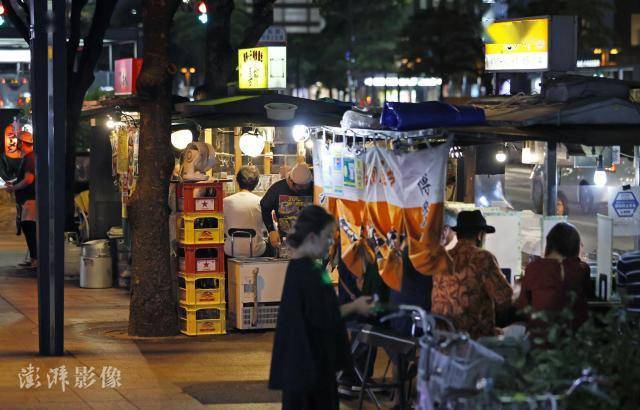Original title: Japan's anti epidemic "unclear" so "lying win"? Experts from various countries began to guess
[text / observer net Ju Feng]
The Japanese epidemic has not been on the news for a long time.
In October 11th, novel coronavirus pneumonia in Japan, the epicentre of Tokyo, confirmed 49 new cases, reaching the lowest point this year. 62 people were added today (14th), below 100 for six consecutive days. In retrospect, during the Olympic Games, there were more than 5000 new cases a day in Tokyo. However, in the past two months, the Japanese government has not implemented any new anti epidemic measures, and the new growth has plummeted by 90%
The British guardian has issued a document to "celebrate" Japan and explain how Japan has become an "unexpected success story".
Japan's anti epidemic, really so "lying win"?
This strange phenomenon has attracted international attention. Western media called Japan's rapid improvement a "mystery". Japanese and overseas experts have not yet understood why the number of infected people has decreased "mysteriously" and put forward various hypotheses. Some Japanese doctors were also puzzled, saying that the epidemic might "end so inexplicably". Incidentally, South Korea, which has always resented Japan, insists that "the Japanese government tampers with data".

The number of newly infected people in Tokyo in the past three weeks was cut from the Tokyo news
"The fifth wave" of "roller coaster"
The epidemic data in Japan continued to decline. According to the Japan Broadcasting Association (NHK) reported on the 14th, there were 62 newly confirmed cases in Tokyo that day, falling below 100 for six consecutive days. There were 12 new deaths. On the 14th, there were 40 severe patients, 3 less than the previous day.

Japan's "fifth wave" epidemic intercepted by the news
Recently, the number of newly diagnosed cases in Japan has dropped sharply. On the 10th, only 60 people were added in Tokyo. Osaka Prefecture added the most, 105 people. The country added 553 people that day, the lowest point of this year. In the past month, the number of new people in Japan has decreased by about 8000. In about two months, the number of new people in Tokyo alone reached 5534 a day.
South Korea is full of doubts about the sudden end of the epidemic. According to the October 7th issue of "Sankei Shimbun", Jin Yujun, a famous Korean political commentator, declared in the popular show that "it is impossible to reduce the number of infected persons by 90% in 1 months. If so, there is no COVID-19 in the world. There must be fraud in the Japanese government."
South Korea's "Central Daily" said that "Japanese experts have not been able to clearly say the reason", which may be "the illusion caused by less detection".
"End in obscurity"?
The sharp decline in the number of infections surprised not only Japanese and overseas media, but also experts. You know, the Japanese government has always focused on "appeal" in combating the epidemic, and the prevention and control policy is very flexible. Even in an emergency, it lacks strong restraint means, and is called the representative of "Buddhist anti epidemic" by Chinese netizens.
On October 11, when attending a news program of the Tokyo Broadcasting Corporation, Feng Morita, a distinguished professor and doctor of the eldest wife women's University, said that the epidemic might "end so inexplicably".
"I hope our experts will fully analyze the reasons for the decrease in the number of infected people," said Hideo toyohara, a political commentator who participated in the program
As an expert, Morita Feng said, "it's hard to explain. It's hard to explain that we came to this step without 'closing the city'."
He introduced that he and about 10 other doctors hold video conferences every week. 50% of doctors believe that the reason is "the rapid rise of vaccination rate and people's sense of urgency", while the remaining 50% say "unclear", "mysterious and magical".
Morita said, "some places are illogical from a medical point of view. It is important to try to find out the answer."
The epidemic is like a "mystery". Why?
For this problem, overseas experts mainly put forward two hypotheses. First, the epidemic caused by the "delta" mutant strain "comes and goes quickly"; Second, a wave of epidemic takes four months as a cycle.
On October 5, Britain's iNews news network interviewed mark Woolhouse, an epidemiologist at the University of Edinburgh. He believes that the situation in Japan may be because the "delta" strain "moves faster in the crowd". "The epidemic in delta is more 'steep', coming faster and going faster."

"The number of confirmed cases in Japan has plunged like a mystery", screenshot of iNews report
The second hypothesis is that the epidemic takes a four month cycle. The New York Times said there was a "mysterious two-month cycle" of the epidemic.
The New York Times reported on October 4 that countries have different anti epidemic measures and policies, but in fact, the epidemic data of the United States, Germany and Japan will find some common ground.
In the United States, the number of infections increased rapidly in the two months from November 2020 to January this year. It has been declining for the next two months. In addition, the number of infections increased again from mid June to August, and then decreased from October.
In Germany, from November 2020 to early March this year, the number of infected people increased in two months and decreased in two months. Then it rose again from early March to the end of April and began to decline from early July, which is also a cycle of about two months.
The number of infected people in Japan began to increase in March 2021 and began to decrease in mid June. In addition, the number of "fifth wave" infections increased in late August and now (October) began to decrease. It can be seen that Japan has also repeated this cycle.
The New York Times pointed out that season is one of the main factors in this conjecture. Japan, the United States and Germany, the transmission rate of virus is high in summer and winter.
According to ER mufang of the medical school of Showa University, it is still seasonal. It is difficult to open windows and ventilation in summer and winter, while it is easy to go outdoors for ventilation in spring and autumn.
According to this hypothesis, the "Sixth Wave" epidemic in Japan will come in winter. Kenji Shibuya, director of Xinguan vaccination medical center in Xiangma City, Fukushima Prefecture, said that the "Sixth Wave" may come. Considering seasonal factors, it will start from the end of October to about November.

On October 1, the emergency was lifted and the urban area became lively again (source: surging image)
Japanese experts analyzed that the vaccination rate has greatly improved and played a vital role.
According to Sankei Shimbun, on October 6, Takashi wabata, director of the National Institute of infectious diseases and head of the epidemic expert group of the Ministry of health and welfare, an authoritative expert in Japan, said that the vaccination of medical personnel and the elderly has played an effective role in preventing infection.
According to the latest statistics of our world in data, Japan's vaccination completion rate has reached 65%, ranking eighth in the world.
In addition, wabata Longzi said, "this wave of epidemic started because of young people and ended because of young people."
He said that the continuous holidays began on July 22, and young people became active in society. The high temperature in summer increases the number of people staying indoors, which also increases the risk of infection. Then the media began to widely report the severity of the epidemic, "convalescent death at home", "urgent hospital bed" and other news made people raise their vigilance and strengthen prevention and control measures.
Wabata Longzi admitted that experts have not figured out the reasons for the rapid reduction of infected people and need to take time to analyze.
Some scholars warned that the epidemic was driven by a specific age group and carried out a "vicious circle". Jason Tetro, a Canadian infectious disease expert and author of the bacterial code, said that different age groups become the "fuel" for virus transmission, which depends on their different vaccination progress and previous infection.
"We must completely eliminate the virus, otherwise we will continue to see the peak of the epidemic until 85% of people are immune to the mainstream strain," he told Reuters
"This is the only way out of this vicious circle"He said.
主营业务:website,cms,wap website




 扫一扫,关注我们最新消息
扫一扫,关注我们最新消息 